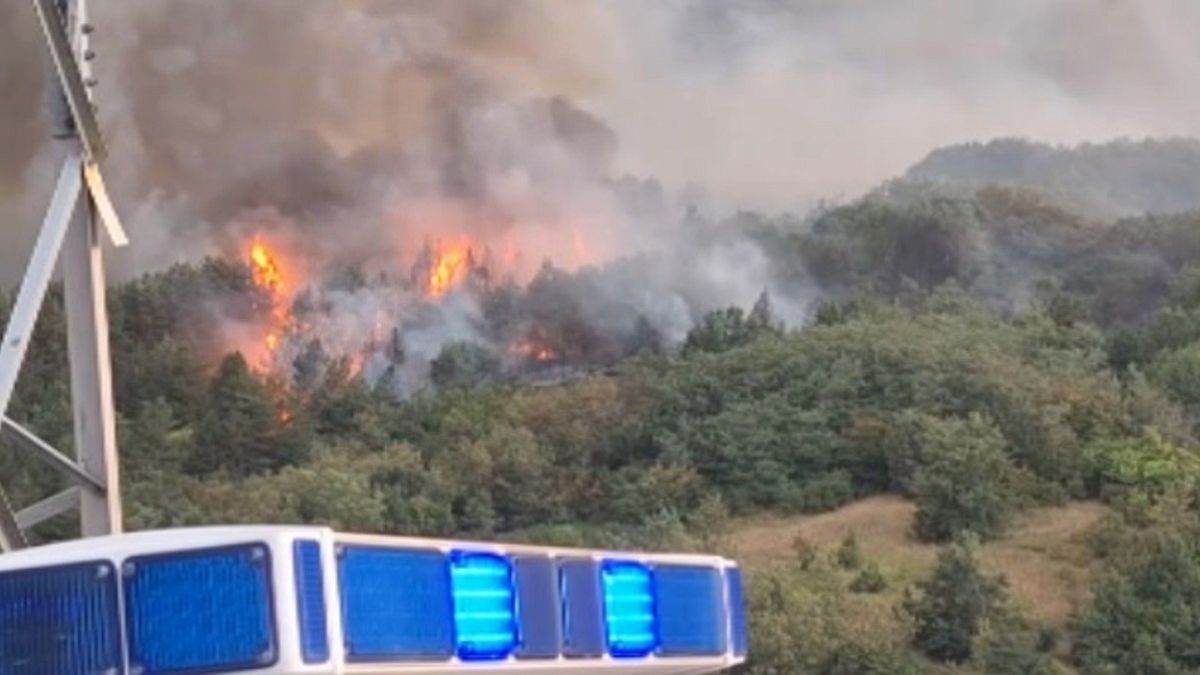Firefighting crews from neighboring Serbia, Croatia, and Slovenia have come together to assist in putting out at least 20 wildfires that have been raging in parts of North Macedonia for the past 10 days. The European Union has coordinated this joint effort after receiving requests for help from the North Macedonian government. The most widespread fire is currently burning in Serta Mountain, near Negotino, where approximately 700–800 hectares of pine forest have been engulfed by flames.
Authorities in North Macedonia have issued warnings to the public, advising people to stay indoors as much as possible and to avoid heavy labor during the hottest hours of the day. Emergency measures put in place include keeping pregnant women and individuals over the age of 60 off work, as well as banning construction activities from 11 a.m. to 5 p.m. Additionally, kindergarten classes are not permitted to be kept indoors after 11 a.m. The number of wildfires in the country has been on the rise, with 14 fires reported nationwide in just 24 hours last week.
The extreme heatwave that has affected many countries in the southern and eastern regions of Europe this month has been attributed to a wave of hot air originating from North Africa. Weather forecasts predict that the unusually high temperatures will persist for a few more days, with temperatures expected to reach as high as 35–40 °C in countries such as Serbia, Italy, Albania, Greece, Romania, and Bulgaria. The World Bank has warned that Western Balkan economies will need to invest at least 33 billion euros over the next decade to mitigate the effects of climate change.
The joint effort by firefighting crews from Serbia, Croatia, and Slovenia, alongside EU coordination, has been crucial in combating the wildfires that have been burning in North Macedonia for over a week. The assistance provided by neighboring countries highlights the importance of international cooperation in addressing natural disasters, especially in the face of extreme weather conditions caused by climate change. The wildfires in Serta Mountain and other areas have posed significant challenges to local authorities, who have issued warnings to the public and implemented emergency measures to protect vulnerable groups such as pregnant women and the elderly.
As the heatwave continues to grip many parts of southern and eastern Europe, health officials have reported an increase in calls to emergency responders due to heat-related health problems. The soaring temperatures, driven by hot air from North Africa, have created dangerous conditions that have prompted governments to take precautionary measures to ensure the safety of their citizens. The World Bank’s warning about the need for substantial investments to combat the effects of climate change highlights the urgent need for countries to prioritize climate resilience and adaptation measures in the face of rising temperatures and extreme weather events.
In conclusion, the wildfires in North Macedonia, exacerbated by the ongoing heatwave, serve as a stark reminder of the impacts of climate change on vulnerable regions. The joint efforts of neighboring countries and the EU to combat the blazes demonstrate the importance of international cooperation in responding to natural disasters and mitigating their destructive effects. As temperatures continue to soar in parts of Europe, it is essential for governments to prioritize climate resilience measures and invest in long-term strategies to protect against the growing threats posed by extreme weather events. Only through concerted action and collaboration can countries effectively address the challenges posed by climate change and safeguard the well-being of their populations.










